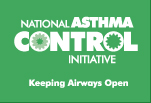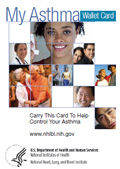NACI Clinical Champions Program
Everyone counts in the fight to reduce the burden of asthma, but health professionals play a key role.
That’s why the National Asthma Education and Prevention Program (NAEPP) developed the NACI Clinical Champions Program to engage health care professionals in their communities, and across the country, in overcoming barriers to the consistent use of clinical guidelines to improve asthma care. Five NACI Clinical Champions were selected through a competitive process based upon the strength of their proposals to expand the reach of the quality improvement strategies and tools they tested as NACI Demonstration Projects and Strategic Partners. They are working with clinicians to create meaningful and lasting improvements in asthma care, and to create new leaders for asthma control.
Through these efforts and more, the NACI Clinical Champions Program strives to:
- Increase adoption by primary care providers of the six key messages from the NAEPP’s Guidelines Implementation Panel (GIP) Report.
- Stimulate the integration and implementation of the six GIP messages throughout health systems via a network of informed and respected health care providers.
- Bring about positive changes in practice behaviors consistent with the GIP messages.
Project Descriptions
Medical Society of Virginia Foundation (Richmond, VA)
The Medical Society of Virginia Foundation will expand upon its NACI Demonstration Project—Improving Asthma Care and Treatment (IMPACT) quality improvement initiative—by funding seven additional teams to expand and replicate the project. IMPACT is a successful program for practice improvement that enables physician teams to improve the identification of patients with asthma; appropriately classify their severity; assess their asthma control at follow-up visits; and provide them with a plan to recognize and manage an exacerbation. [Full Profile]
Michigan Department of Community Health (Lansing, MI)
This project will enhance existing communication efforts created by the Michigan Department of Community Health’s NACI Demonstration Project, Guideline Implementation Steps and Tools (GIST), with a concentrated push to raise awareness of the GIP messages and best practices for successful guideline implementation. Its target audience is primary care providers in high-burden communities, with an emphasis on safety-net practices. [Full Profile]
South Bronx Asthma Partnership/Bronx-Lebanon Hospital Center (Bronx, NY)
The South Bronx Asthma Partnership’s NACI Champions program is called From Paper to Patient (P2P): Junior Faculty as Asthma Champions in Nation-Wide Pediatric Practices. P2P will conduct interactive, specialist-delivered workshops to cultivate Asthma Champions who will nurture systems change in their respective practices and local regions. [Full Profile]
University of California, San Francisco (San Francisco, CA)
The University of California, San Francisco’s (UCSF) Champions project will build upon past success with primary care provider education by identifying asthma champions in primary care practices that serve minority and underserved families in the San Francisco Bay Area, and training them on GIP messages as well as on methods to facilitate discussion and promote practice change. To reach a greater number of providers in each practice, the UCSF team will develop one-hour presentations based on the Physician Asthma Care Education (PACE) program and UCSF’s current Demonstration Project, Applying PACE to Underserved Communities (APPUC), for the asthma champions and asthma expert to present to other providers at primary care practices. [Full Profile]
University of Washington (Seattle, WA)
The University of Washington will build upon its existing NACI Strategic Partnership project, Spirometry 360, by adding an online “train the trainer” component to the program. The goal is to begin the ongoing development and support of independently sustainable training sites around the country, creating a virtual community of health professionals who are engaged in asthma improvement work, with an initial focus on spirometry training. [Full Profile]

















 Twitter
Twitter
 Facebook
Facebook YouTube
YouTube